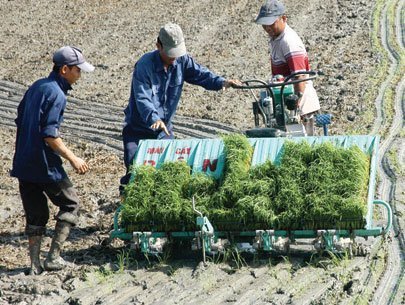VietNamNet Bridge – Local authorities have decided to remove some industrial
zones (IZs) to make room for the rice fields.

In Tay Ninh province, when programming the land fund many years ago, districts’
authorities all want to build industrial parks which they believed would help
develop local economies, bring more turnover and generate jobs.
However, their plan has not come true. After many years, the IZs still cannot
attract investors. Meanwhile, the land has been life unused, causing a big waste
to the natural resources. As a result, the localities have to reconsider their
land use programming and they have decided to remove a lot of IZs out from the
program.
According to Pham Van Quan, Deputy Director of the Tay Ninh provincial
Department of Industry and Trade, the province has decided to eliminate 10 out
of the 23 programmed IZs to take back 1250 hectares of land, which would be
given back to rice fields, rubber and cassava plants.
Quan said that in the last few years, as districts’ authorities rushed to build
IZs, the number of IZs has soared to 23, which have appropriated the land for
agricultural production.
The 10 IZs which have been excluded from the IZ development program include Binh
Minh, Co Khi, Bau Rong, Long Chu, Tien Thuan, Bau Don, Suoi Ngo, Tan Dong, Dong
Khoi and Suoi Can, of which Bau Don, Long Chu and Bau Rong have the designed
development area of more than 200 hectares.
In principle, Quan said, only the IZs to be developed on public or wild land
would be maintained, while the IZs on rice, rubber or cassava land would be
removed. The rubber trees on the land have grown, which means that it would be
very costly to compensate farmers for the site clearance.
The HCM City authorities in 2007 decided to develop 30 IZs, expected to cover an
area of 1900 hectares. However, according to the city’s Industry and Trade
Department, only 11 IZs have found infrastructure developers so far, and only
three of which have attracted businesses, namely Xuan Thoi Son A, Nhi Xuan and
Le Minh Xuan.
In a recent report, the department pointed out that it is very difficult to
attract infrastructure developers, because it always takes much money to
compensate people to take land.
Truong Minh Khach, a senior official of the HCM City Department for Industry and
Trade, said that the city would remove some IZs which would lead to the decrease
of the land area for industrial production to 1100 hectares.
Instead of building IZs, the land areas would be reserved for ornamental plants,
farm produce, or would be used for the trade, service and residential quarter
purposes.
The Dong Nai provincial authorities, who planned to develop 43 IZs, are
considering weeding out some IZs from the list of programmed IZs after seeing
that a lot of IZs remain on paper, and many others have been left idle in remote
areas.
Statistics showed that people’s committees have approved 1640 IZ development
projects by 2020.
Source: TBKTSG
- © Copyright of Vietnamnet Global.
- Tel: 024 3772 7988 Fax: (024) 37722734
- Email: evnn@vietnamnet.vn